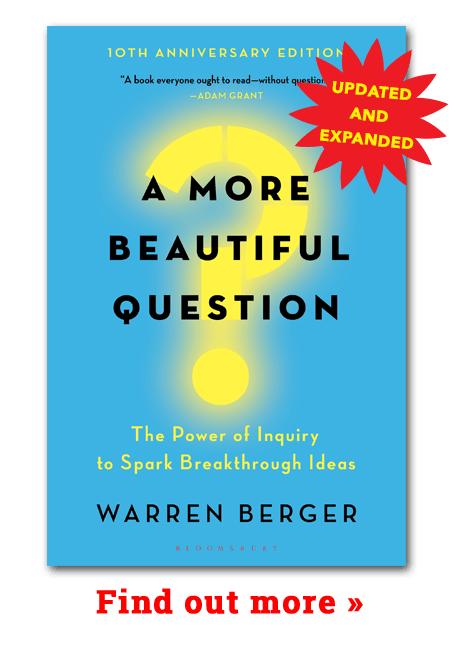
Warren and Woz
A while back I was invited to do an onstage interview with Apple co-founder Steve Wozniak at the MPI World Education Congress in Minneapolis (this may be a side-benefit of writing a book on questioning; people come to you when they need a questioner). Wozniak, who goes by “Woz,” is best-known for single-handedly designing the revolutionary Apple I and Apple II computers. In our talk, he shared some wonderful anecdotes about this and other episodes in his rich, interesting life. (My own favorite moment came when he mentioned a dream he’d recently had; in the dream he figured out how to eliminate just one more chip from the Apple II, some 30-odd years after the fact.)
But the real reason I want to mention Woz here on the AMBQ site is because, in preparing for the interview, I discovered something interesting about him. I read his autobiography, iWoz: Computer Geek to Cult Icon: How I Invented the Personal Computer, Co-Founded Apple, and Had Fun Doing It, and there’s a great section where he talks about his father, Francis Jacob (Jerry) Wozniak, who was an engineer at Electronic Data Systems and then at Lockheed, back in the late 1950s and early 60s.
Because of his father’s line of work, young Woz grew up with “all kinds of interesting things lying around my house. And when you’re in a house and there are resistors lying around everywhere, you ask, ‘What’s that? What’s a resistor?’ And my dad would always give me an answer, a really good answer even a seven-year-old could understand.”
When his father would explain to him what a resistor was, “he started from the beginning, going all the way back to atoms and electrons, neutrons and protons. He explained what they were and how everything was made from these.” And when young Woz asked, How does a lightbulb work?, his father told him about electrons traveling through wires, and how it led to the end result of a glowing bulb.
“I was eight or even younger when I understood this,” Woz writes, “and knowing it made me feel different from all the other kids I knew. I started to feel as if I knew secrets no one else knew.”
According to Woz, the most important thing his father taught him was “what it means to be an engineer… He told me that as an engineer, you change your world and change the way of life for lots and lots of people.”
 Which Woz eventually did, of course. I think there’s a lesson here—and it’s one I’ve seen echoed in other stories of young innovators and their formative influences. In so many of the stories, there is a young questioner and there is an adult (often a parent, sometimes a grandparent, uncle, or schoolteacher) who cares deeply about those questions. It seems that when kids routinely ask What is that? and How does it work?, the answers you give in response—and perhaps more importantly, the way you answer those questions, the level of interest and passion shown—may be far more significant than it might seem at the time.
Which Woz eventually did, of course. I think there’s a lesson here—and it’s one I’ve seen echoed in other stories of young innovators and their formative influences. In so many of the stories, there is a young questioner and there is an adult (often a parent, sometimes a grandparent, uncle, or schoolteacher) who cares deeply about those questions. It seems that when kids routinely ask What is that? and How does it work?, the answers you give in response—and perhaps more importantly, the way you answer those questions, the level of interest and passion shown—may be far more significant than it might seem at the time.
Check out the full Fast Company article “The Wisdom of Woz: Apple Cofounder Steve Wozniak Shares 9 Tips for Starting Companies, Solving Problems, and Finding Happiness.”


